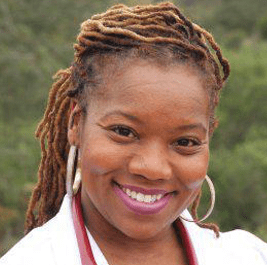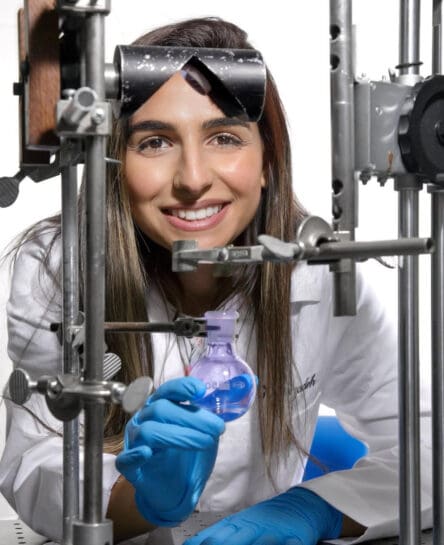Department Chair

Ni Chadhain, Sinead
Associate Professor and Department Chair
My research focuses on understanding how bacteria, both individually and as communities, respond to various contaminants. We take two different approaches to this problem. The first involves isolating pure cultures involved in the degradation or transformation of specific chemical compounds and characterizing the genes and enzymes involved in the process. The second approach uses molecular biology techniques to study microbial communities. Many studies have shown that greater than 99% of the bacteria found in nature have yet to be grown in the laboratory. Our challenge is to figure out what these microorganisms are doing in the environment. Molecular tools such as PCR, gene probing, mRNA transcript analysis, and DNA and RNA sequencing can aid in this endeavor by allowing us to study microbial activity without growing the bacteria in the lab.
We’re also interested in water quality, specifically assessment of fecal pollution of surface waters. We use a combination of culture-based and molecular methods to assess both abundance and sources of fecal pollution in local waters. Learn more about our work in Mobile Bay, AL learn more here
Program Coordinators

Ali, Nawab
Professor, Coordinator of Graduate Studies
Molecular Biology, Biotechnology
Office Location: ETAS 329G
Phone: 501-916-6518
[email protected]
Research Interests
My research interests encompass interdisciplinary areas of biochemistry, biotechnology, and cell and molecular biology. Major focus is on understanding receptor mediated signal transduction, as well as intracellular signaling mechanisms mediated by G-proteins and their receptors, second messengers such as inositol polyphosphates, protein kinases, and phosphatases. Emphasis is placed on subcellular compartmentalization, vesicular membrane trafficking, protein-protein interactions, and cellular regulation of apoptosis. My laboratory is also interested in bioinformatics and proteomics approaches in understanding evolutionary and phylogenetic adaptations of genes in higher life forms relative to lower organisms. Biomedical engineering interests include development and characterization of novel nanomaterials for biomedical applications. We are also interested in NASA-related research on counter measure approaches to biological effects of microgravity.
Primary Teaching
BIOL 2401 – Microbiology
BIOL 4190 – Senior Biology Seminar
ASCI 7399 – Signal Transduction and Regulation of Cell Function

White, Rebekah
Visiting Instructor and Coordinator of Undergraduate Studies
Office Location: FH 406C
Email: [email protected]
I have conducted research on blue-green algae, primarily Synechocystis sp. PCC 6803, focusing on cyanobacterial ultrastructure and thylakoid membrane organization. My work also involved electron microscopy and automated cellular image analysis. I am interested in pedagogical research and evidence-based approaches to improve biology teaching and learning.
Primary Teaching
Cell Biology
Genetics
Science of Biology
Faculty

He, Qingfang
Professor
Molecular Genetics, Biotechnology
Office Location: FH 406
Phone: 501-916-6533
[email protected]
Research Interests
The major research emphases of our laboratory have been studying the molecular mechanisms by which cyanobacteria acclimate to high light (HL) stress and engineering cyanobacteria for the production of plant secondary metabolites. We are particularly interested in the function and regulation of a family of four HL-inducible polypeptides (HLIP) in the cyanobacterium Synechocystis sp. PCC 6803. HLIPs are required for cyanobacterial to survive the exposure to HL, which causes oxidative stress, redox disturbance and other stresses that result in reduction in photosynthesis and the cell viability. These research activities elucidate HL-stress signaling pathways and reveal the molecular machineries that cells exploit for stress responses. We are also highly interested in using cyanobacteria and other microalgae as bioreactors for the production of plant secondary metabolites, biofuel, and valuable proteins. This is so far a field at its very early stage of development, however, its prospect in research and industry is foreseeable as microalgae systems offer potential advantages (e.g. tolerance to high salinity, ease to tailor genetically and grow in low cost media) over many current existing systems. We are exploring the potential of cyanobacteria as a “cell factory” to produce phenylpropanoids and unsaturated fatty acids. We also use the cyanobacterial cells as a complex “experiment station” to study the functions of these compounds in stress defense and cell survival.
Primary Teaching
BIOL 3300 – Genetics
BIOL 4413/5413 – Immunology
ASCI 7385 – Concepts in Genetic Analysis
ASCI 7387 – Genomics

Clifton, Ian
Assistant Professor
Integrative Biology, Evolutionary Ecology
Office Location: FH413
Phone: 501-916-6528
[email protected]
Research Interests
I am an integrative biologist and evolutionary ecologist focused on investigating the mechanisms underlying organismal responses to rapid environmental change. I am particularly interested in understanding the role of phenotypic plasticity in mediating these responses in reptiles and the molecular processes underpinning that plasticity. I employ laboratory and field experiments to explore physiological, morphological, and behavioral variation within and among populations and the eco-evolutionary processes underlying that variation, with the aim of understanding how that variation and the eco-evolutionary processes at work affect long-term population and species persistence in changing environments.
Primary Teaching
BIOL 1400- Evolutionary and Environmental Biology
BIOL 3303- Principles of Ecology
BIOL 4310- Evolution

Grace, Stephen C.
Associate Professor, Director of Campus Garden
Plant Biochemistry, Plant Physiology
Office Location: SCLB 377
Phone: 501-916-6522
[email protected]
Research Interests
I am a plant physiologist specializing in plant biochemistry and metabolism with the aim of improving both the nutritional value and stress tolerance of crops. My research interests include: metabolomics and metabolic regulation in plants, identification and characterization of high value plant natural products, oxidative stress, antioxidants, and oxidant signaling mechanisms, physiological ecology of plant secondary metabolism, and bioenergetic scaling and plant productivity. I am also Director of the UA Little Rock Campus Garden. This is an ongoing project to establish a working campus garden to promote training in urban agriculture for teaching, research, and public service.
Primary Teaching
BIOL 2402 – Botany
BIOL 4419/5419 – Plant Physiology
BIOL 4499/5499 – Metabolomics
BIOL 4399 – Plants, Food, and People

Hearnsberger, Scott
Instructor
Anatomy and Physiology
Contact Information
Office Location: FH 314
Phone: 501-916-6524
[email protected]
Research Interests
I have worked under a NASA grant, examining bone resorption and vascular reactivity using hindlimb suspension models, simulating a microgravity environment. Studies included examining the effects of dietary phytoestrogens on vascular reactivity and the rates of bone resorption.
Primary Teaching
BIOL 1411 – Human Anatomy & Physiology I
BIOL 1412 – Human Anatomy & Physiology II
BIOL 1433 – Essentials of Human Anatomy & Physiology

Khodakovskaya, Mariya
Professor, Director of Applied Sciences
Plant Biology, Molecular Technology
Office Location: ETAS 353B
Phone: 501-916-6525
[email protected]
Research Interests
We are working on the development of innovative approaches for the enhancement of plant productivity and plant tolerance to environmental stress using advanced methods of genetic engineering, molecular biology, and nanotechnology. An important part of our work is understanding the molecular mechanisms of the positive effects of nanomaterials in crops. To clarify the basis for enhancement of plant productivity and stress tolerance caused by the application of nanomaterials, we are investigating the effects of nanomaterials on total plant transcriptome, proteome, and metabolome.
Primary Teaching
BIOL 4427/5427 – Tissue Engineering
BIOL 4399/5399 – Biochemistry of Biological Molecules
ASCI 7386 – Recombinant DNA Methods and Applications

Lesch, Raffaela
Assistant Professor
Animal Behavior
Office Location: FH 410
Phone: 501-916-6536
[email protected]
Research Interests
I’m a zoologist and bioacoustician specialized in domesticated animals. My research focuses on the intersection of domestication and bioacoustics. I’m interested in how domestication, urbanization, and anthropogenic pressures shape animal behavior, communication, morphology, and anatomy. One of the main questions driving my research at the moment is how proximity to humans has affected mammalian anatomy.
My lab, the Urban Domestication Lab, has updates on current research programs and opportunities!
Primary Teaching
BIOL 2403 – Zoology

Tang, Fusheng
Associate Professor
Molecular Biology of Aging
Office Location: SCLB 385
Phone: 501-916-6530
[email protected]
Research Interests
The target of rapamycin complex 1 (TORC1) is an essential enzyme complex for cell growth. However, a subset of TORC1 negatively regulates lifespan extension. Using the model organism budding yeast, we found that a two-fold up-regulation of a lipid transporter Osh6 significantly extends the replicative lifespan, a measure of rounds of cell division. Intriguingly, this longevity manipulation down-regulates TORC1 but does not harm cell growth, suggesting a specific repression of the pro-aging subset of TORC1. We are exploring the underlying mechanisms for such repression with a combination of biochemical, cell biological, genetical, and genomics approaches. Since human homologs of Osh6 and mTORC1 are involved in the development of cancer and other age-dependent diseases, elucidation of the anti-aging mechanisms triggered by Osh6 would provide insights to practices aimed at extending the lifespan of stem cells as well as the health span of humans.
Primary Teaching
BIOL 2401 – Microbiology
BIOL 3300 – Genetics
BIOL 4418/5418 – Biotechnology
BIOL 4499/5499 – Genomics

Wang, Hongli
Associate Professor
Plant Molecular Biology
Office Location: FH 411
Phone: 501-916-6531
[email protected]
Research Interests
Improvement of crop yield and nutritional quality has always been my research goal. High yield and high nutritional quality super crops need to possess the following attributes: (1) have extraordinary capacity of assimilation (i.e. photosynthesis, mineral element absorption and nitrogen fixation); (2) preferentially transport and accumulate assimilates to economically significant organs; (3) should be highly capable to adapt their structures and developmental processes in response to environmental stresses; (4) be highly resistant to diseases (viruses, bacteria and fungi) and insects. Therefore, my lab and I are undertaking research to understand the physiological, cellular and molecular bases of these processes, and as well as their underlying controlling and regulatory mechanisms via interdisciplinary approaches: Plant Physiology, Plant Cell and Molecular Biology, Genomics, and Plant Development and Nutrition.
Primary Teaching
BIOL 1401 – Science of Biology
BIOL 4426/5426 – Plant and Human Nutrition
Staff

Current, Andrew
Administrative Analyst
Office Location: FH 406
Phone: 501-916-6527
[email protected]

Johnson, Dawn
Senior Research Assistant
Office Location: FH 406
Phone: 501-916-3270
[email protected]
Adjunct Faculty

Allen, William
Professor
Human Anatomy
[email protected]

Clark, David
Professor
Zoology
[email protected]

Green, Reed
Professor
Botany
[email protected]

Wilson, Michael
Clinical Biology
[email protected]
Visiting Faculty

Shine, Jahaz
Visiting Assistant Professor
Intro Human Anatomy and Physiology I & II
ST: Clinical Biol Medical Term and Diagnosis
Fribourgh Hall 404
[email protected]

Hesabizadeh, Tina
Visiting Instructor
Intro Human Anatomy & Physiology I
Microbiology
Fribourgh Hall 402
[email protected]
Emeritus and Retired Professors
Lanza, Janet (retired 2016)
Evolutionary Ecology, Plant-Animal Interactions
[email protected]
Stapleton, Carl (retired 2022)
Environmental Health
[email protected]
Winter, Jim (retired 2018)
Aquatic Ecology
[email protected]
Bush, John
Cell and Molecular Biology, Clinical Biology
[email protected]
Baltosser, William H.
Biostatistics, Molecular Systematics, Ecology
[email protected]
Sikes, Robert S.
Behavioral and Evolutionary Ecology
[email protected]
